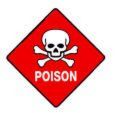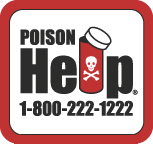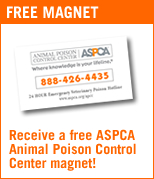|

There are many poisons and toxic plants in and around our homes or other environments (dog parks, hiking trails, etc) that are potential life-threatening hazards to our animal companions. It is impossible to list every poison or toxic plant, as some animals may respond adversely to non-toxic plants and substances. It is extremely important to be aware of what is known to be toxic or poisonous and to ensure that your animal companion does not have access to those substances or plants. Also, here in Las Vegas, there are poisonous insects, spiders, and snakes. The ASPCA has a list of non-toxic and toxic substances and plants on their website for quick reference. If you are unsure of the type of fauna or flora that is in or around your home, take a sample to your local nursery for identification. Make sure you ask for the common and scientific names.
Exposure to a toxic substance includes ingestion or skin contact. Many substances can be absorbed through the skin, eyes, mucous membranes or pads, such as oils, grease, antifreeze, detergents, and other liquid substances. Treatment or decontamination will depend on the substance of exposure.
Tips:
Make yourself aware of the toxic plants and substances that are in your animal companion's environment and prevent access
Contact your veterinarian immediately if your animal companion is suspected of exposure to a poisonous substance or toxic plant and IS showing signs of illness, to include vomiting, diarrhea, panting, weakness, or any other abnormality
Contact an animal poison control center immediately if your animal companion is suspected of exposure to a poisonous substance or toxic plant and IS NOT showing any signs of illness
DO NOT induce vomiting until speaking with a poison control representative or your veterinarian. In some cases, vomiting should not be induced
If the animal does vomit, collect the emesis in a plastic container or bag and take it to your veterinarian
If you suspect a poisonous substance exposure, have the package available to relay information to a poison control representative or your veterinarian
If the animal is covered in the toxic substance or chemical, prevent contamination of yourself by wrapping them in a blanket or placing them in a carrier

Rocky Mountain Poison & Drug Center
The RMPDC is the certified regional poison center for Colorado, Nevada, Idaho, Montana and Hawaii

ASPCA Animal Poison Control Center
The ASPCA Animal Poison Control Center hotline operates 24 hours a day, 7 days a week, at (888) 426-4435. There is a $60 consultation fee, payable by credit card, for this service. This includes follow-up consultation should you or your vet need further assistance with your pet’s case.

Click above to visit the ASPCA Animal Poison Control Center website and see a list of toxic plants, poisonous substances, and obtain other poison safety information. You can also get a free pet safety pack!!
|








